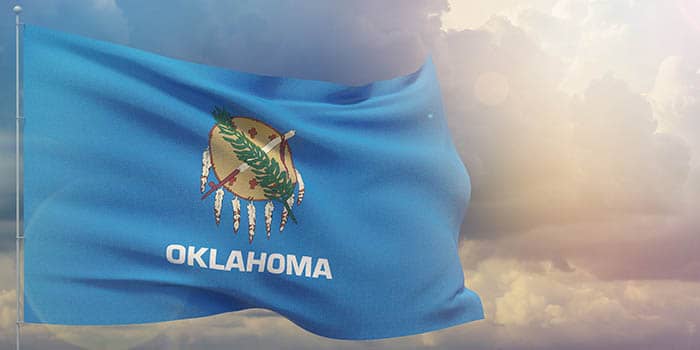
Oklahoma Attorney General Declares United Keetoowah Band’s Gaming Compact Invalid
In a recent development, Oklahoma Attorney General Gentner Drummond has declared that the Class III gaming compact submitted by the United Keetoowah Band (UKB) of Cherokee Indians to the US Department of the Interior (DOI) for federal approval is not legally valid. This decision has sparked controversy and raised questions about the legalities surrounding tribal gaming compacts in the state.
Background of the Issue
Back in April, the United Keetoowah Band finalized and signed Oklahoma’s Model Tribal Gaming Compact. This compact allows federally recognized tribes to operate slot machines and live dealer table games on their sovereign lands, following approval by state voters in a 2024 referendum. However, part 15 of the compact states that tribes must have executed the agreement with both the state and federal government before January 1, 2020.
Attorney General Drummond argues that since the original model compact expired on January 1, 2020, the UKB’s signature on the compact is invalid. Additionally, he claims that the UKB should have obtained approval from the Joint Committee on State-Tribal Relations before submitting the compact to the DOI.
Cherokee Legal Status Complicates the Situation
The legal status of the Cherokee Nation has further complicated the case. The UKB, which did not sign the Model Tribal Gaming Compact before 2020, had its federal status in question for many years. It was only in January that the Bureau of Indian Affairs within the US DOI determined that the United Keetoowah Band is an equal successor to the Old Cherokee Nation, alongside the current Cherokee Nation.
The Cherokee Nation has long claimed to be the sole legal successor to the Old Cherokee, leading to disputes over land ownership. The UKB previously operated a Class II bingo hall in Tahlequah until the Cherokee Nation contested the status of the land.
Impact on Oklahoma Tribal Nations
Despite the legal challenges faced by the UKB, tribal nations in Oklahoma continue to make a significant economic impact in the state, primarily due to their exclusive gaming rights. A recent study revealed that Oklahoma collected $208 million in exclusivity fees, indicating a 36% increase over the past five years.
In conclusion, the invalidation of the UKB’s gaming compact has raised concerns within the tribal gaming industry in Oklahoma. It remains to be seen how this issue will be resolved and what implications it may have on future gaming agreements between tribes and the state.
ความซับซ้อนในการแก้ไขสถานการณ์
สถานะกฎหมายของชาวเชอโรกีแอะเนียยิ่นในขณะนี้ได้ทำให้เหตุการณ์ซับซ้อนมากขึ้น. สมาชิกของ UKB ที่ไม่ได้ลงนามในร่วมการเล่นเกมของพันธมิตรแบบพื้นบ้านก่อนปี 2020 มีรายละอียดในการเข้าถึงจากทรัพยากรเกี่ยวกับชาติในกรมด้านเกี่ยวกับเรื่องสหภาพเท่าเทียมกับชาติเก่าของชาติชีโรกีร่วมกับชาติชีโรกีปัจจุบันเพียงในเดือนมกราคม. ชาติชีโรกีได้ประกาศตนเป็นผู้สืบทอดทางกฎหมายเพียงที่เดียวและทำให้เกิดข้อโต้แย้งเกี่ยวกับการครอบครองที่ดิน. UKB ก่อนหน้านี้ได้ดำเนินการสวนกลับชั้นที่ 2 ในเทศบาลที่ลุคอาไลจนถึงชาติชีโรกีที่เป็นอ้างที่สถานะของที่ดิน.
ผลกระทบต่อชาติชนในรัฐโอคลาโฮมา
ถึงแม้ UKB จะเผชิญกับความท้าทายในด้านกฎหมาย ชาติชนในรัฐโอคลาโฮมายังคงมีผลกระทบทางเศรษฐกิจสำคัญในรัฐ โดยส่วนใหญ่เนื่องจากสิทธิสมบูรณ์ในการเล่นเกม. การศึกษาล่าสุดพบว่ารัฐโอคลาโฮมาได้รับค่าบริการเพียง 20 ล้านเหรียญ หมายความว่ามีการเพิ่มขึ้นถึง 36% ในช่วง 5 ปีที่ผ่านมา.
ในสรุป การทำให้สัญญาเล่นเกมของ UKB ไม่ถูกต้อง ได้เพิ่มข้อกังวลในวงการการเล่นเกมของชาติชนในรัฐโอคลาโฮมา. ยังไม่ทราบว่าปัญหานี้จะถูกแก้ไขอย่างไรและจะมีผลต่อข้อความของสัญญาเพื่อการเล่นเกมระหว่างชาติชนกับรัฐอย่างไร



